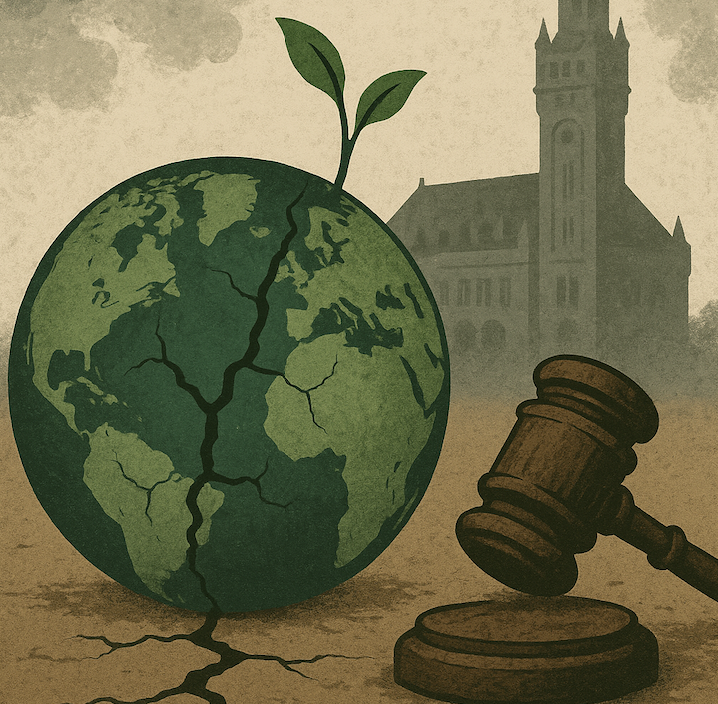Approximately after 2 years, the International Court of Justice finally released its advisory opinion about the obligations of States in respect of climate change. In its opinion, the ICJ examined the growing threat of climate change and its status under international law—focusing in particular on the measures States are required to take and linking these obligations to the law of State responsibility.
This blog post briefly examines the practical feasibility of concrete actions in line with the core idea of the advisory opinion, by firstly discussing the judicial and non-judicial meaning of advisory opinions in terms of their power to influence state conduct, then by demonstrating a dimension distinct from the advisory opinion itself: the political realities.
- The Advisory Opinion
This section, as a brief analysis of the advisory opinion, will give the attention to the question referred to the ICJ regarding state responsibility on global warming, the legal rules considered by the Court in addressing this question, the legal nature of such responsibility, and the rules that would be triggered in case of a breach. In this way, it will be demonstrated how the ICJ seeks to incorporate this contemporary issue within the framework of legal norms
The Court, in its opinion, addressed the following questions posed by the General Assembly regarding climate change:
“(a) What are the obligations of States under international law to ensure the protection of the climate system and other parts of the environment from anthropogenic emissions of greenhouse gases for States and for present and future generations?
(b) What are the legal consequences under these obligations for States where they, by their acts and omissions, have caused significant harm to the climate system and other parts of the environment, with respect to:
(i) States, including, in particular, small island developing States, which due to their geographical circumstances and level of development, are injured or specially affected by or are particularly vulnerable to the adverse effects of climate change?
(ii) Peoples and individuals of the present and future generations affected by the adverse effects of climate change ?”
Within this framework, the ICJ positioned itself as the authority tasked with identifying States’ obligations by examining the applicable norms of international law (see paras. 98-100). When addressing legal consequences of non-compliance, it referred to international law of state responsibility (paras. 104-106). It is necessary to note that the ICJ did not formulate its advisory opinion on the basis of greenhouse gases’ (GHG) emissions, but rather on the premise that States must not, through acts or omissions, cause violations of the primary rules of international law that address climate change. The violations will be considered as an act of State in respect to the law of responsibility. (paras. 107-108)
With regard to the notion of “specially affected” or “particularly vulnerable” States, the Court clarified that these terms do not, in themselves, create a new understanding nor a different form of State responsibility. These designations are preferably relevant with primary rules of international law such as maritime zones and entitlements and contain no such relation with secondary rules in international legal framework. (paras. 109-110)
Relating to the part (ii) of the question (b), the Court decided that a responsibility may arise vis-a-vis an individual only when there is a specific legal instrument that creates substantive and procedural rights and obligations between the States and the individuals concerned. (para. 111)
In its legal approach, the Court identified the applicable law (paras. 113-173) as:
-Treaties (such as the UN Charter, UNCLOS, climate change treaties like Paris Agreement and UNFCCC along with Kyoto Protocol and finally “other environmental treaties”), (paras. 113-130)
-Customary international law (by referring duty to prevent significant harm of environment and duty to co-operate for the protection of the environment) (paras. 131-142)
-International human rights law, (paras. 143-145)
-“Other principles” (e.g. “need to reconcile economic development with protection of the environment” as a guide for interpretation of certain treaties.) (paras. 146-160)
Additionally, by its own nature (due to the common interest of all States in the protection of the global environment), a potential breach of obligation may be raised by all other states. In other words, these obligations have an erga omnes character. (paras. 439-443)
According to the ICJ, in case of a violation of these primary rules, then the law of international state responsibility will be applied. Thus, after violation of the primary rule; the perpetrator State will have a duty to cease violation and guarantee to not repeat, a duty to perform its primary obligations in the aftermath, despite their breaches. Additionally, the obligations of restitution (if possible), compensation and/or satisfaction will emerge against the violator. (paras. 444-456)
As a result, it can be said that this advisory opinion may be called a milestone for all of the international community in order to preserve the environment, mitigate damages and ensure ecological welfare, all by creating a legal sketch for guaranteeing an overall restriction for environmentally harmful actions.
However, in order to inspect and measure its applicability in practical situations, a deeper analysis of the legal quality of “advisory opinions” and of solid political stances of states are required.
- Role of Advisory Opinions in International Enforcement
The reason for examining the legal status of advisory opinions in general is to assess whether, in the specific case of climate change, the advisory opinion may prompt states to take legally (or otherwise) responsive action.
As it is clear from its name, the advisory opinions of ICJ are not legally binding. However, there is no doubt that they carry significant legal weight and moral authority (also see here). As a result, advisory opinions often serve a guiding function and are regarded as prestigious, highly respected, and thoroughly researched contributions to international legal discourse.
To put it simply, the advisory opinions made by the ICJ still carry a persuasive authority. For example, as observed by the ITLOS vis-à-vis the ICJ’s Chagos Opinion (see footnote 135 in its Mauritius/Maldives case, para. 205) determinations made by the ICJ in an advisory opinion cannot be disregarded simply because the opinion is not binding.
The tribunal gave considerable weight to the ICJ’s Chagos Advisory Opinion, noting that the ICJ had “clarified” the legal status of the Chagos Islands such that any UK claim to sovereignty was reduced to a “mere assertion” incapable of disputing the issue.
There are, in fact, various examples in which advisory opinions have served as points of reference in a variety of disputes, being invoked by different judges and arbitrators. However, their practical impact is not confined to judicial proceedings or legal documents. In today’s world the influence of advisory opinions extends to the broader public sphere. News media, social media, and other tools for raising public awareness have become key drivers of movements, shaping public opinion and influencing policy decisions. In this context, the publication of advisory opinions on globally sensitive issues can have a significant effect in mobilizing public sentiment and political action.
As one striking example beyond the question of climate change, the Wall Advisory Opinion is a great example for stimulating diplomatic, political and social mobilization (see here and here) about the illegality of the construction of a wall in the Palestinian territory. Advisory opinions can thus serve as instruments of “preventive diplomacy”, giving the UN a legal foundation to build international consensus.
Even if advisory opinions are legally non-binding, it does not mean that they cannot play a role in the future development of a customary norm. During a search and identification of an intangible but newly incarnating (or even existing) customary law; different resources such as the jurisprudence and the doctrinal work (see ILC’s conclusions 13 and 14 and as per ICJ Statute Art 38) are being used. Advisory opinions may be used for that purpose too (see here, and here), considering its persuasive function. So, this advisory opinion on climate change may be a first step for creation of a custom specifically determined for climate change and green policies for the environment.
In this concrete example, climate change is considered as a major and an undeniable problem which will impact generations of humanity. Issuing an advisory opinion about such an issue has the potential to reinforce the growing wave of legal and political scrutiny in the end. It may even contribute, over time, to reshaping existing legal norms.
- An Analysis of Existing State Policies
Apart from the advisory opinion itself, examining whether the states’ current political stance will lead them to act in accordance with the opinion is important to determine whether the ICJ’s statements aiming to address the highlighted problem will remain merely declaratory or have actual impact.
The conclusion of the advisory opinion about climate change seems to have both sociological, psychological and even legal effects, as discussed before. Nevertheless, the possibility to execute concrete measures by States is heavily dependent on their political will. In 2024, due to various reasons (price, technological infrastructure, influences of different interest groups etc.); the total energy production in the world was still dominated by fossil fuels, proving that the majority of the States consider environmental problems as ‘secondary’. Especially States with the highest energy production rates, such as; China, the United States and the Russian Federation appear to be dominated by fossil fuels (in the year of 2023).
Even when acknowledging recent initiatives toward renewable energy, as of this very recent period, the dominant global policy orientation has still not substantially shifted toward the reduction of carbon emissions.
Another aspect worth emphasizing is that some treaties include provisions which soften the implementation of environmental policies. Actually, it can be shown as a sign to prove the principality of States’ will and thus, conclusion of treaties in that accordance. The provisions of Joint Implementation, Clean Development Mechanism and Emissions Trading (article 6,12,17 respectively) in the Kyoto Protocol are excellent examples for it. The protocol in general has been a subject of criticism or of antithetical observations from time to time by different experts.
The key issue here is, even in a scenario where the majority of the States try to embrace eco-friendly policies, it is generally attached to the States which are engaged in large-scale energy use or play a significant role in the trade of diverse energy resources, due to the very nature of the matter. A single act of an energy giant can shatter all of the ambitions in this advisory opinion.
With no doubt, a State is not completely independent from its social realities and grassroots movements of the 21st century. In the example of Kenya, the government changed its course due to the Green Belt Movement. As mentioned in the 2nd part of this text, social movements are significant in determining States’ decisions in the global stage and taking account of the potential influence of advisory opinion, it can indirectly affect the reorganization of State policies because of its potential to trigger masses.
It is necessary to say that the States’, while deciding on their policies, often fall into a tension between the rising environmental consciousness among their people and certain interest groups, both having a certain amount of influence on their attitude.
Although energy-sector companies currently exert greater influence over state environmental and climate policies due to their large capital holdings, an increasing number of grassroots communities (also see here, here, and here)—empowered by collective public forces in response to the tangible impacts of global warming—are gradually but visibly asserting themselves. With the publication of this advisory opinion and the ensuing public discourse, these communities may coalesce around its themes and strengthen their position in shaping state policy.
In summary, the current situation shows us the States did not substantially take an ultimate step before nor after the publication of the advisory opinion, but it does not mean that they can stay immune to the recent events. Also, it is inconceivable that a decision—both legally and morally significant—by the world court would not impact a dynamic societal structure that, through advanced communication tools, rapidly acquires information and grows increasingly sensitive, nor that such impact would fail to evolve into empowered and potentially escalating forms of protest or another form of movement.
- Conclusion
The advisory opinion of the ICJ about the obligations of States in respect of Climate Change examines the legal position of the principal actors of international law, concerning recent material deteriorations of global warming, under the general context of 3rd generation rights – environment – and tries to conciliate legal basis with material conjuncture. The Court does not seem indifferent to the increasing sound and conscience of environmental sensitivity and tries to give a response to the main perpetrators for the emission of GHG, the States (instead of the individuals or corporations), by skillfully using the international law of responsibility as a tool.
While it is difficult to draw a definitive conclusion from the advisory opinion, considering its legal nature, political realities, and recent data, it becomes evident that the possibility of a legally and practically viable development, regarding environmental protection can no longer be overlooked.





